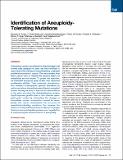Identification of Aneuploidy-Tolerating Mutations
Author(s)
Torres, Eduardo Martin; Dephoure, Noah; Panneerselvam, Amudha; Tucker, Cheryl M.; Whittaker, Charles A.; Gygi, Steven P.; Dunham, Maitreya J.; Amon, Angelika B; ... Show more Show less
DownloadAmon_Identification of aneuploidy.pdf (1.331Mb)
PUBLISHER_POLICY
Publisher Policy
Article is made available in accordance with the publisher's policy and may be subject to US copyright law. Please refer to the publisher's site for terms of use.
Terms of use
Metadata
Show full item recordAbstract
Aneuploidy causes a proliferative disadvantage in all normal cells analyzed to date, yet this condition is associated with a disease characterized by unabated proliferative potential, cancer. The mechanisms that allow cancer cells to tolerate the adverse effects of aneuploidy are not known. To probe this question, we identified aneuploid yeast strains with improved proliferative abilities. Their molecular characterization revealed strain-specific genetic alterations as well as mutations shared between different aneuploid strains. Among the latter, a loss-of-function mutation in the gene encoding the deubiquitinating enzyme Ubp6 improves growth rates in four different aneuploid yeast strains by attenuating the changes in intracellular protein composition caused by aneuploidy. Our results demonstrate the existence of aneuploidy-tolerating mutations that improve the fitness of multiple different aneuploidies and highlight the importance of ubiquitin-proteasomal degradation in suppressing the adverse effects of aneuploidy.
Date issued
2010-10Department
Massachusetts Institute of Technology. Department of Biology; Koch Institute for Integrative Cancer Research at MITJournal
Cell
Publisher
Elsevier B.V.
Citation
Torres, Eduardo M., Noah Dephoure, Amudha Panneerselvam, Cheryl M. Tucker, Charles A. Whittaker, Steven P. Gygi, Maitreya J. Dunham, and Angelika Amon. “Identification of Aneuploidy-Tolerating Mutations.” Cell 143, no. 1 (October 2010): 71-83. © 2010 Elsevier Inc.
Version: Final published version
ISSN
00928674
1097-4172